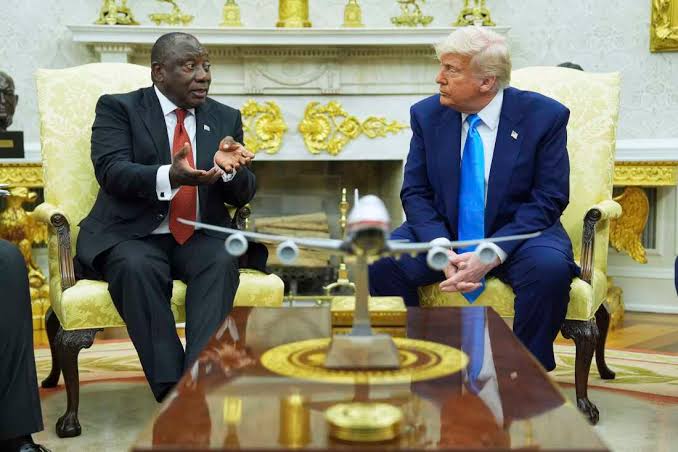- South African President Cyril Ramaphosa is in Washington, D.C., aiming to rebuild strained diplomatic ties with U.S. President Donald Trump and tech billionaire Elon Musk. The visit follows controversial and unsubstantiated claims from Washington about “white genocide” targeting Afrikaners in South Africa—allegations that Pretoria firmly denies.
Ramaphosa was accompanied to the White House by prominent figures including golfing legends Ernie Els and Retief Goosen, along with South Africa’s wealthiest individual, Johann Rupert. Their presence appeared designed to resonate with Trump, an avid golf enthusiast.
The White House confirmed that Elon Musk, a South African-born entrepreneur and close Trump advisor, would also attend the high-level discussions. Musk has been vocal in echoing claims of anti-white policies in South Africa, a narrative Ramaphosa’s administration is eager to correct.
The visit comes shortly after around 50 white South Africans reportedly arrived in the U.S., responding to Trump’s offer of “refuge,” despite ongoing restrictions on asylum from other regions under his administration’s hardline immigration policies.
Ramaphosa is also expected to present a strategic offering: a proposal allowing Musk’s Starlink satellite internet service to operate in South Africa. However, Musk has criticized the country’s post-apartheid affirmative action policies, labeling them as “openly racist” and a barrier to Starlink’s market entry.
Ramaphosa’s spokesperson, Vincent Magwenya, stated the President aims to “reset the relationship” with the U.S., South Africa’s second-largest trading partner. At the same time, Ramaphosa will directly address and refute the “patently false” narrative of white genocide.
Land Reform in the Spotlight
One of the key tensions involves South Africa’s recent land expropriation law, signed in January. The legislation is designed to address the deep-rooted inequality stemming from decades of white minority rule, but has faced fierce opposition from Trump’s administration and right-wing groups, who interpret it as a threat to white landowners.
The Trump administration has also criticized South Africa’s genocide case against Israel at the International Court of Justice, slashed foreign aid, introduced steep tariffs, and expelled South Africa’s ambassador following his critique of Trump’s “Make America Great Again” (MAGA) platform.
Trump and Musk have promoted the narrative that white farmers are being targeted and killed in large numbers—a claim authorities in South Africa refute. According to police statistics, the majority of the country’s high murder rates affect young black men in urban areas, not rural white farmers.
While land ownership remains a highly sensitive issue—white South Africans, who make up just 7.3% of the population, still control most of the country’s farmland—Ramaphosa insists the new policy is aimed at equity, not racial persecution.

